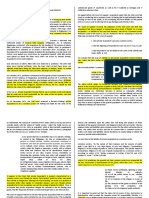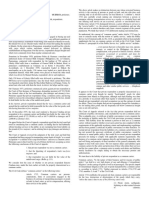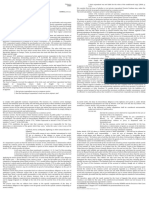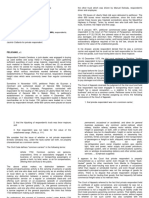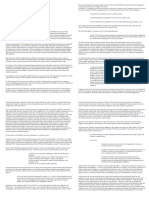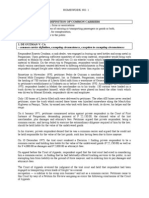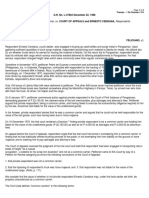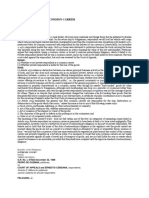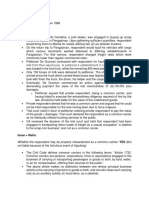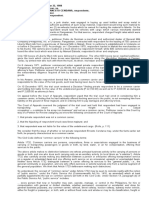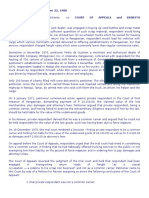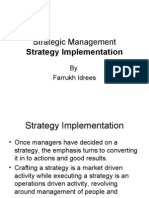0 ratings0% found this document useful (0 votes)
18 viewsDE GUZMAN v. CA
DE GUZMAN v. CA
Uploaded by
Jovelan V. Escaño1) The document discusses whether respondent Ernesto Cendana can be considered a common carrier in a case where he transported goods for merchants but claimed it was not his primary occupation.
2) The court found that Ernesto was properly characterized as a common carrier even though he only occasionally transported goods as back-hauls, as he charged customers a fee and offered transportation services to the public.
3) However, the court also found that Ernesto was not liable for goods that were hijacked during transport, as the robbery met the standard of an unforeseeable event beyond his control, provided he exercised extraordinary diligence as a common carrier.
Copyright:
© All Rights Reserved
Available Formats
Download as DOC, PDF, TXT or read online from Scribd
DE GUZMAN v. CA
DE GUZMAN v. CA
Uploaded by
Jovelan V. Escaño0 ratings0% found this document useful (0 votes)
18 views1 page1) The document discusses whether respondent Ernesto Cendana can be considered a common carrier in a case where he transported goods for merchants but claimed it was not his primary occupation.
2) The court found that Ernesto was properly characterized as a common carrier even though he only occasionally transported goods as back-hauls, as he charged customers a fee and offered transportation services to the public.
3) However, the court also found that Ernesto was not liable for goods that were hijacked during transport, as the robbery met the standard of an unforeseeable event beyond his control, provided he exercised extraordinary diligence as a common carrier.
Original Title
14. DE GUZMAN v. CA
Copyright
© © All Rights Reserved
Available Formats
DOC, PDF, TXT or read online from Scribd
Share this document
Did you find this document useful?
Is this content inappropriate?
1) The document discusses whether respondent Ernesto Cendana can be considered a common carrier in a case where he transported goods for merchants but claimed it was not his primary occupation.
2) The court found that Ernesto was properly characterized as a common carrier even though he only occasionally transported goods as back-hauls, as he charged customers a fee and offered transportation services to the public.
3) However, the court also found that Ernesto was not liable for goods that were hijacked during transport, as the robbery met the standard of an unforeseeable event beyond his control, provided he exercised extraordinary diligence as a common carrier.
Copyright:
© All Rights Reserved
Available Formats
Download as DOC, PDF, TXT or read online from Scribd
Download as doc, pdf, or txt
0 ratings0% found this document useful (0 votes)
18 views1 pageDE GUZMAN v. CA
DE GUZMAN v. CA
Uploaded by
Jovelan V. Escaño1) The document discusses whether respondent Ernesto Cendana can be considered a common carrier in a case where he transported goods for merchants but claimed it was not his primary occupation.
2) The court found that Ernesto was properly characterized as a common carrier even though he only occasionally transported goods as back-hauls, as he charged customers a fee and offered transportation services to the public.
3) However, the court also found that Ernesto was not liable for goods that were hijacked during transport, as the robbery met the standard of an unforeseeable event beyond his control, provided he exercised extraordinary diligence as a common carrier.
Copyright:
© All Rights Reserved
Available Formats
Download as DOC, PDF, TXT or read online from Scribd
Download as doc, pdf, or txt
You are on page 1of 1
14. DE GUZMAN v.
CA offering such service on an occasional, episodic or unscheduled basis; neither does
G.R. No. L-47822 / DEC 22, 1988 / FELICIANO, J./ DEFINITION AND TEST OF COMMON Article 1732 distinguish between a carrier offering its services to the "general public"
CARRIER CONCEPT
PETITIONERS PEDRO DE GUZMAN -Under Section 13, par. b of the Public Service Act, “public service” includes:
RESPONDENTS COURT OF APPEALS and ERNESTO CENDANA
“... every person that now or hereafter may own, operate, manage, or control
FACTS. in the Philippines, for hire or compensation, with general or limited clientele,
Respondent Ernesto Cendana (junk dealer) would load his vehicle with cargo which various whether permanent, occasional or accidental, and done for general business
merchants wanted to be delivered, charging fee lower than the commercial rates on return purposes, any common carrier, railroad, street railway, traction railway etc..”
trips to Manila from Pangasinan.
-Respondent Ernesto is properly characterized as a common carrier even though he
Petitioner Pedro de Guzman (merchant and authorized dealer of General Milk Company, merely “back-hauled” goods for other merchants from Manila to Pangasinan, although
Inc.) contracted with respondent Ernesto for hauling 750 cartons of Liberty milk from a such back-hauling was done on a periodic or occasional rather than regular or
warehouse in Makati to petitioner Pedro’s establishment in Urdaneta. scheduled manner, and even though it was not his principal occupation but there is
no dispute that Ernesto charged his customers a fee for hauling their goods
Respondent Ernesto loaded in Makati the merchandise on his truck: 150 cartons were
loaded on the truck by Ernesto, while 600 were placed on board the other truck drive by -The liability arises the moment a person or firm acts as a common carrier, without
Manuel Estrada (Ernesto’s driver and employee). regard to whether or not such carrier has also complied with the requirements of the
applicable regulatory statute and implementing regulations and has been granted a
Only 150 boxes of milk were delivered to petitioner Pedro and the other 600 never reached certificate of public convenience or other franchise
him since the truck which carried these boxes was hijacked somewhere along MacArthur
Highway by armed men who took with them the truck, its driver, his helper, and cargo. -The law imposes duties and liabilities upon common carriers for the safety and
protection of those who utilize their services and the law cannot allow a common
Petitioner Pedro commenced an action against respondent Ernesto in CFI, demanding carrier to render such duties and liabilities merely facultative by simply failing to obtain
payment of P22k for value of the lost merchandise, arguing that being a common carrier and the necessary permits and authorizations
failing to exercise extraordinary diligence required of him by law should be liable for the
loss. With regard to respondent Ernesto’s liability:
-The hijacking of the carrier’s truck does not fall within the 5 categories of exempting
Respondent Ernesto denied that he was a common carrier and argued that he cannot be held
causes listed in Art. 1734
responsible for such loss was due to force majeure.
-However, the Court holds that the limits of duty of extraordinary diligence in the
Trial court found respondent Ernesto to be a common carrier and ordered him to pay for the vigilance over the goods carried were reached where the goods are lost as a result of
value of undelivered goods. robbery which is attended by grave or irresistible threat, violence, or force
Ernesto filed appeal with CA REVERESED trial court judgment and held that Ernesto -The occurrence of the loss must be reasonably regarded as quite beyond the control
had been engaged in transporting return loads of freight as casual occupation (a sideline to of the common carrier and properly regarded as fortuitous event it must be recalled
his scrap business and not as a common carrier) and held no certificate of public that even common carriers are not made absolute insurers against all risks of travel
convenience and transport of goods which cannot be foreseen or are inevitable provided, they shall
have complies with standard of extraordinary diligence
ISSUES & RATIO.
1. WON respondent Ernesto Cendana can be considered a common carrier. – YES. DECISION.
-Art. 1732 Common carriers are persons, corporations, firms or associations Petition is DENIED.
engaged in the business of carrying or transporting passengers or goods or both, by Winner: Petitioner Ernesto de Guzman
land, water, or air for compensation, offering their services to the public.
-The above article makes no distinction between one whose principal business
activity is the carrying of persons or goods or both, and one who does such carrying
only as an ancillary activity ("a sideline")
-Article 1732 also carefully avoids making any distinction between a person or
enterprise offering transportation service on a regular or scheduled basis and one
You might also like
- Ebook Introduction To Environmental Assessment A Guide To Principles and Practice 4Th Edition Bram F Noble Online PDF All ChapterDocument69 pagesEbook Introduction To Environmental Assessment A Guide To Principles and Practice 4Th Edition Bram F Noble Online PDF All Chaptertom.roberson65790% (10)
- LITURGY and SACRAMENTS Lesson 1 Introduction To The LiturgyDocument16 pagesLITURGY and SACRAMENTS Lesson 1 Introduction To The LiturgyGodwin Jerome Reyes100% (1)
- 114 Prats v. Phoenix AssuranceDocument2 pages114 Prats v. Phoenix AssuranceJovelan V. Escaño100% (1)
- Final Assault On Kirton Mcconkieb1 Armageddon 1Document237 pagesFinal Assault On Kirton Mcconkieb1 Armageddon 1api-499975778No ratings yet
- COURT OF APPEALS - Reversed The Trial Court: MajeureDocument3 pagesCOURT OF APPEALS - Reversed The Trial Court: MajeureMay ChanNo ratings yet
- COMM ReviewerDocument195 pagesCOMM ReviewerheymissrubyNo ratings yet
- (Transporttation Cases Part I) : Vicente D. Millora For Petitioner. Jacinto Callanta For Private RespondentDocument48 pages(Transporttation Cases Part I) : Vicente D. Millora For Petitioner. Jacinto Callanta For Private RespondentTet VergaraNo ratings yet
- Transportation Law Full TextsDocument40 pagesTransportation Law Full TextsLouis pNo ratings yet
- Transpo CasesDocument172 pagesTranspo CasespaescorpisoNo ratings yet
- Common CarriersDocument38 pagesCommon CarriersammeNo ratings yet
- Transpo Cases 2Document35 pagesTranspo Cases 2Nicole Ann Delos ReyesNo ratings yet
- Supreme Court: Vicente D. Millora For Petitioner. Jacinto Callanta For Private RespondentDocument4 pagesSupreme Court: Vicente D. Millora For Petitioner. Jacinto Callanta For Private RespondentEzra Dan BelarminoNo ratings yet
- And Done For General Business Purposes, Any Common Carrier, Railroad, Street Railway, Traction RailwayDocument39 pagesAnd Done For General Business Purposes, Any Common Carrier, Railroad, Street Railway, Traction RailwayD Del SalNo ratings yet
- (Transpo) Cases Batch 1Document33 pages(Transpo) Cases Batch 1lazzyb0nesNo ratings yet
- Supreme Court: Vicente D. Millora For Petitioner. Jacinto Callanta For Private RespondentDocument17 pagesSupreme Court: Vicente D. Millora For Petitioner. Jacinto Callanta For Private RespondentKenneth MatabanNo ratings yet
- Transpo CasesDocument65 pagesTranspo CasesTet VergaraNo ratings yet
- Print TodayDocument30 pagesPrint TodaySamantha Bonilla BaricauaNo ratings yet
- Transpo Fulltext 1Document30 pagesTranspo Fulltext 1Angelee Therese AlayonNo ratings yet
- Vicente D. Millora For Petitioner. Jacinto Callanta For Private RespondentDocument3 pagesVicente D. Millora For Petitioner. Jacinto Callanta For Private RespondentJosef MacanasNo ratings yet
- Episodic or Unscheduled Basis. Neither Does Article 1732 Distinguish Between A Carrier Offering Its ServicesDocument3 pagesEpisodic or Unscheduled Basis. Neither Does Article 1732 Distinguish Between A Carrier Offering Its ServicesHerbert JavierNo ratings yet
- Transpo First ExamDocument25 pagesTranspo First ExamaverellabrasaldoNo ratings yet
- Pedro de Guzman vs. CaDocument3 pagesPedro de Guzman vs. CaMhali100% (1)
- Supreme Court: Vicente D. Millora For Petitioner. Jacinto Callanta For Private RespondentDocument15 pagesSupreme Court: Vicente D. Millora For Petitioner. Jacinto Callanta For Private RespondentK-phrenCandariNo ratings yet
- de Guzman v. Court of Appeals 168 SCRA 617 Through Carrying of Goods Not The Principal OccupationDocument97 pagesde Guzman v. Court of Appeals 168 SCRA 617 Through Carrying of Goods Not The Principal OccupationAyme SoNo ratings yet
- Clientele, Whether Permanent, Occasional or Accidental, and Done For General Business Purposes, Any Common Carrier, Railroad, Street RailwayDocument22 pagesClientele, Whether Permanent, Occasional or Accidental, and Done For General Business Purposes, Any Common Carrier, Railroad, Street RailwaySupermanNo ratings yet
- Pedro de Guzman, Petitioner, vs. Court of Appeals and ERNESTO CENDANA, RespondentDocument54 pagesPedro de Guzman, Petitioner, vs. Court of Appeals and ERNESTO CENDANA, RespondentKim Laurente-AlibNo ratings yet
- A. Common Carrier in General (Cases)Document81 pagesA. Common Carrier in General (Cases)paoNo ratings yet
- Consolidated Cases 1Document18 pagesConsolidated Cases 1Princess Janine SyNo ratings yet
- de Guzman V CADocument2 pagesde Guzman V CAChaNo ratings yet
- Guzman Vs CADocument2 pagesGuzman Vs CAJuris FormaranNo ratings yet
- (CASE NO.1) : Transportation LawDocument119 pages(CASE NO.1) : Transportation LawGrester FernandezNo ratings yet
- Zenith Insurance vs. CADocument4 pagesZenith Insurance vs. CABen OriondoNo ratings yet
- Deldio Transpo Midterms Case DigestsDocument129 pagesDeldio Transpo Midterms Case DigestsBrianCarpioNo ratings yet
- Transpo Case 1-3Document4 pagesTranspo Case 1-3claire beltranNo ratings yet
- Transpo HW Nov16 Full CaseDocument42 pagesTranspo HW Nov16 Full CasezippyNo ratings yet
- (G.R. No. L-47822, December 22, 1988)Document4 pages(G.R. No. L-47822, December 22, 1988)Jasmin RodriguezNo ratings yet
- Galvo Vs UCPBDocument3 pagesGalvo Vs UCPBJuris FormaranNo ratings yet
- 1 - de Guzman v. Court of Appeals, G.R. No. L-47822, 22 December 1988, (168 SCRA 612)Document4 pages1 - de Guzman v. Court of Appeals, G.R. No. L-47822, 22 December 1988, (168 SCRA 612)BryanNo ratings yet
- Transpo CaseDocument4 pagesTranspo CasePatrice ThiamNo ratings yet
- Transpo Cases ADocument133 pagesTranspo Cases AJenMarlon Corpuz AquinoNo ratings yet
- Transportation Law Cases (Art. 1732)Document97 pagesTransportation Law Cases (Art. 1732)Macky CaballesNo ratings yet
- Pedro de Guzman Vs CADocument5 pagesPedro de Guzman Vs CAValentine MoralesNo ratings yet
- Vicente D. Millora For Petitioner. Jacinto Callanta For Private RespondentDocument28 pagesVicente D. Millora For Petitioner. Jacinto Callanta For Private RespondentRon AceroNo ratings yet
- Assignment No.1Document80 pagesAssignment No.1Trisha RamentoNo ratings yet
- TRANSPO First Set of CasesDocument62 pagesTRANSPO First Set of CasesDMMCorrespondent Lady BelleNo ratings yet
- Assignment No.1Document85 pagesAssignment No.1Trisha RamentoNo ratings yet
- Perena vs. NicolasDocument25 pagesPerena vs. Nicolasj guevarraNo ratings yet
- Common Carriers in General TranspoDocument96 pagesCommon Carriers in General Transporgomez_940509No ratings yet
- De Guzman V CaDocument2 pagesDe Guzman V CaElaizza ConcepcionNo ratings yet
- 14 de Guzman v. CADocument3 pages14 de Guzman v. CARem SerranoNo ratings yet
- De Guzman v. Court of AppealsDocument4 pagesDe Guzman v. Court of AppealsMeet MeatNo ratings yet
- TL - de Guzman vs. CA, GR No. L-47822, Dec. 22, 1988Document4 pagesTL - de Guzman vs. CA, GR No. L-47822, Dec. 22, 1988Jec Luceriaga BiraquitNo ratings yet
- Cases 1732,1733,1766Document83 pagesCases 1732,1733,1766Jenely Joy Areola-TelanNo ratings yet
- Vicente D. Millora For Petitioner. Jacinto Callanta For Private RespondentDocument83 pagesVicente D. Millora For Petitioner. Jacinto Callanta For Private RespondentJenely Joy Areola-TelanNo ratings yet
- Vicente D. Millora For Petitioner. Jacinto Callanta For Private RespondentDocument24 pagesVicente D. Millora For Petitioner. Jacinto Callanta For Private Respondentchard apolloNo ratings yet
- Pedro de Guzman Vs CaDocument11 pagesPedro de Guzman Vs CaSor ElleNo ratings yet
- Supreme CourtDocument2 pagesSupreme CourtErik CelinoNo ratings yet
- Fulltxt 1Document91 pagesFulltxt 1Don SumiogNo ratings yet
- III. Common Carriers - A.1. Definitions, Essential Elements, B. LiberalDocument3 pagesIII. Common Carriers - A.1. Definitions, Essential Elements, B. LiberalJul A.No ratings yet
- Transpo CasesDocument23 pagesTranspo CasesJustin Andre SiguanNo ratings yet
- PEDRO DE GUZMAN, Petitioner, Court of Appeals and Ernesto Cendana, RespondentsDocument20 pagesPEDRO DE GUZMAN, Petitioner, Court of Appeals and Ernesto Cendana, RespondentsFBNo ratings yet
- Pedro de Guzman VDocument4 pagesPedro de Guzman VGhadahNo ratings yet
- G.R. No. L-47822 December 22, 1988 PEDRO DE GUZMAN, PetitionerDocument24 pagesG.R. No. L-47822 December 22, 1988 PEDRO DE GUZMAN, PetitionerJoan ChristineNo ratings yet
- Pacis vs. Morales - EscanoDocument2 pagesPacis vs. Morales - EscanoJovelan V. EscañoNo ratings yet
- St. Joseph's College v. Miranda - EscanoDocument2 pagesSt. Joseph's College v. Miranda - EscanoJovelan V. EscañoNo ratings yet
- 142 San Miguel Corporation vs. Heirs of Sabiniano Inguito: G.R. No. 141716. July 4, 2002Document3 pages142 San Miguel Corporation vs. Heirs of Sabiniano Inguito: G.R. No. 141716. July 4, 2002Jovelan V. EscañoNo ratings yet
- Mercury Drug Store v. Sps Huang - EscanoDocument2 pagesMercury Drug Store v. Sps Huang - EscanoJovelan V. EscañoNo ratings yet
- 139 CHOA TIEK SENG vs. CA, FILIPINO MERCHANTS' INSURANCE COMPANY, INC., BEN LINES CONTAINER, LTD. AND E. RAZON, INC. (1990)Document1 page139 CHOA TIEK SENG vs. CA, FILIPINO MERCHANTS' INSURANCE COMPANY, INC., BEN LINES CONTAINER, LTD. AND E. RAZON, INC. (1990)Jovelan V. EscañoNo ratings yet
- 141 Caltex VS Sulpicio LinesDocument2 pages141 Caltex VS Sulpicio LinesJovelan V. EscañoNo ratings yet
- 136 Artex Development Co., Inc. vs. Wellington Insurance Co.Document2 pages136 Artex Development Co., Inc. vs. Wellington Insurance Co.Jovelan V. EscañoNo ratings yet
- Go Tiaco Vs Union Ins. Society of CantonDocument1 pageGo Tiaco Vs Union Ins. Society of CantonEdu100% (1)
- 137 Roque V IACDocument3 pages137 Roque V IACJovelan V. EscañoNo ratings yet
- 135 Gibson v. RevillaDocument2 pages135 Gibson v. RevillaJovelan V. EscañoNo ratings yet
- 153 Bachrach v. British American AssuranceDocument1 page153 Bachrach v. British American AssuranceJovelan V. EscañoNo ratings yet
- Phil. Home Assurance v. CA (1996) DigestDocument1 pagePhil. Home Assurance v. CA (1996) DigestJovelan V. EscañoNo ratings yet
- 154 Ong Guan v. CenturyDocument1 page154 Ong Guan v. CenturyJovelan V. EscañoNo ratings yet
- 152 Jarque Vs Smith BellDocument2 pages152 Jarque Vs Smith BellJovelan V. EscañoNo ratings yet
- 133 Fieldmen's Insurance v. Asian Surety MPDocument1 page133 Fieldmen's Insurance v. Asian Surety MPJovelan V. EscañoNo ratings yet
- 130 La O v. Yek Tong LinDocument1 page130 La O v. Yek Tong LinJovelan V. EscañoNo ratings yet
- 120 Yu Ban Chuan v. FieldmensDocument2 pages120 Yu Ban Chuan v. FieldmensJovelan V. EscañoNo ratings yet
- 128 Pioneer V YapDocument1 page128 Pioneer V YapJovelan V. EscañoNo ratings yet
- 108 Tibay v. CA DigestDocument1 page108 Tibay v. CA DigestJovelan V. EscañoNo ratings yet
- 129 New Life V CADocument2 pages129 New Life V CAJovelan V. EscañoNo ratings yet
- 131 General Lnsurance V NG Hua Double InsuranceDocument2 pages131 General Lnsurance V NG Hua Double InsuranceJovelan V. Escaño0% (1)
- 113 Paris-Manila V Phoenix AssuranceDocument2 pages113 Paris-Manila V Phoenix AssuranceJovelan V. EscañoNo ratings yet
- 117 HEIRS OF ILDEFONSO COSCOLLUELA SR INC V RICO GENERAL INSURANCE CORPORATIONDocument1 page117 HEIRS OF ILDEFONSO COSCOLLUELA SR INC V RICO GENERAL INSURANCE CORPORATIONJovelan V. EscañoNo ratings yet
- 111 American Home Insurance v. ChuaDocument2 pages111 American Home Insurance v. ChuaJovelan V. EscañoNo ratings yet
- 118 FGU Insurance Corporation V CADocument4 pages118 FGU Insurance Corporation V CAJovelan V. EscañoNo ratings yet
- 121 Go Lu v. YorkshireDocument2 pages121 Go Lu v. YorkshireJovelan V. EscañoNo ratings yet
- 115 East Furniture V Globe & Rutgers Fire, L-35848, 57 Phil 576 (1929)Document2 pages115 East Furniture V Globe & Rutgers Fire, L-35848, 57 Phil 576 (1929)Jovelan V. EscañoNo ratings yet
- 112 GREAT PACIFIC LIFE INSURANCE CORPORATION VS. COURT OF APPEALS and TEODORO CORTEZDocument1 page112 GREAT PACIFIC LIFE INSURANCE CORPORATION VS. COURT OF APPEALS and TEODORO CORTEZJovelan V. EscañoNo ratings yet
- 106 Arce v. Capital InsuranceDocument1 page106 Arce v. Capital InsuranceJovelan V. EscañoNo ratings yet
- STS0 12 - Reflective Learning Sheet 1Document2 pagesSTS0 12 - Reflective Learning Sheet 1JULIANA PATRICE PEREZNo ratings yet
- A Dozen City Encounters: by Philip ReedDocument14 pagesA Dozen City Encounters: by Philip ReedAntonio Santos100% (1)
- FDM Report BDocument46 pagesFDM Report BTaha VejlaniNo ratings yet
- NLU OldDocument53 pagesNLU OldKirubakar RadhakrishnanNo ratings yet
- CLUBSstfu (Autoguardado)Document4 pagesCLUBSstfu (Autoguardado)Benjamin José AlcequiezNo ratings yet
- Strategic Management: Strategy ImplementationDocument49 pagesStrategic Management: Strategy ImplementationEhsan AliNo ratings yet
- Sokushinbutsu: Japanese Practice of Self-Mummification: TH THDocument2 pagesSokushinbutsu: Japanese Practice of Self-Mummification: TH THDivinagrace ElenNo ratings yet
- Li and Li-The Dotted Line On The MapDocument9 pagesLi and Li-The Dotted Line On The MapJhay RocasNo ratings yet
- Economic Review English Version 2021Document290 pagesEconomic Review English Version 2021Shalehin IslamNo ratings yet
- HSE Alert 61-20 Heavy Equipment Operator-Rigger ValidationDocument1 pageHSE Alert 61-20 Heavy Equipment Operator-Rigger ValidationaswinNo ratings yet
- Pricelist: SamsungDocument4 pagesPricelist: Samsungbagus yudiartanaNo ratings yet
- Ebix Investor Presentation WebDocument38 pagesEbix Investor Presentation Webamir.workNo ratings yet
- India BIS GT-96300-T3-POE Inclusion CertificateDocument1 pageIndia BIS GT-96300-T3-POE Inclusion Certificaterajeshrobot95No ratings yet
- WorldVedicHeritage Book1 TextDocument368 pagesWorldVedicHeritage Book1 TextInsearchof_KnowledgeNo ratings yet
- Alternative To The Conventional Manufacturing & Project FinancingDocument16 pagesAlternative To The Conventional Manufacturing & Project FinancingShahrukh Sohail100% (2)
- Customer Satisfaction With The Reference of Toyota Hybrid RecallDocument7 pagesCustomer Satisfaction With The Reference of Toyota Hybrid RecallAyesha NoorNo ratings yet
- HiltonPlatt 11e TB Ch13Document64 pagesHiltonPlatt 11e TB Ch13Jay HanNo ratings yet
- ConfirmationDocument2 pagesConfirmationTariq HassanNo ratings yet
- Job Application Letter IndiaDocument4 pagesJob Application Letter Indiagqt3p2cr100% (1)
- How To Use Cookies TutDocument18 pagesHow To Use Cookies TutStb Indi100% (2)
- Modal Verbs - Full ExercisesDocument3 pagesModal Verbs - Full ExercisesDivanti yuniarNo ratings yet
- De Thi Thu Tot Nghiep THPT 2023 Mon Tieng Anh Lien Truong THPT Nghe AnDocument6 pagesDe Thi Thu Tot Nghiep THPT 2023 Mon Tieng Anh Lien Truong THPT Nghe AnPhuc NguyenNo ratings yet
- Vocabulary Test Unit 3 NameDocument2 pagesVocabulary Test Unit 3 Namegabuniek11No ratings yet
- Example Covering Letter - Graduate Job - Nikesh PatelDocument1 pageExample Covering Letter - Graduate Job - Nikesh PatelCharlotte MartinNo ratings yet
- This Content Downloaded From 189.18.52.171 On Wed, 01 Jun 2022 19:24:03 UTCDocument18 pagesThis Content Downloaded From 189.18.52.171 On Wed, 01 Jun 2022 19:24:03 UTCMsq JuliaNo ratings yet
- The Charge of The Light Brigade Knowledge OrganiserDocument1 pageThe Charge of The Light Brigade Knowledge Organiserkaaririnkaka.786No ratings yet
- Jamia Millia Islamia: (A Central University by An Act of Parliament)Document18 pagesJamia Millia Islamia: (A Central University by An Act of Parliament)VinayNo ratings yet





